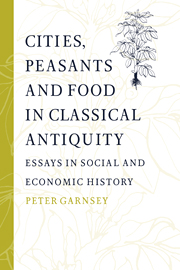Book contents
- Frontmatter
- Contents
- Preface
- Editor's preface
- Acknowledgements
- List of abbreviations
- PART I CITIES
- PART II PEASANTS
- 6 Peasants in ancient Roman society
- 7 Where did Italian peasants live?
- 8 Non-slave labour in the Roman world
- 9 Prolegomenon to a study of the land in the later Roman empire
- 10 Mountain economies in southern Europe
- PART III FOOD
- Bibliography
- Index
10 - Mountain economies in southern Europe
THOUGHTS ON THE EARLY HISTORY, CONTINUITY AND INDIVIDUALITY OF MIDITERRANEAN UPLAND PASTORALISM
Published online by Cambridge University Press: 02 December 2009
- Frontmatter
- Contents
- Preface
- Editor's preface
- Acknowledgements
- List of abbreviations
- PART I CITIES
- PART II PEASANTS
- 6 Peasants in ancient Roman society
- 7 Where did Italian peasants live?
- 8 Non-slave labour in the Roman world
- 9 Prolegomenon to a study of the land in the later Roman empire
- 10 Mountain economies in southern Europe
- PART III FOOD
- Bibliography
- Index
Summary
INTRODUCTION
The perspective of this paper is historical rather than ethnological. This is necessarily the case given my area of specialization (antiquity and early Middle Ages) and the relative paucity of information bearing on Mediterranean mountain societies before documentary evidence becomes available, in the Middle Ages or later. (This is not to say that medieval documents, consisting typically of the records of large, ecclesiastical landholdings (e.g. Wickham (1982); Rowland (1982)), are of the stuff to produce studies comparable with E. Le Roy Ladurie's ‘Montaillou’). However, students of antiquity no longer passively accept the deficiencies of the conventional source material, which is for the most part literary and city-oriented, issuing from a civilization centred on the lowlands, coasts and islands of the Mediterranean region. Archaeology, through the utilization of new techniques such as carbon-dating, pollen analysis, zoo-archaeology and dendrochronology (Bottema (1974); Kuniholm and Striker (1983); Payne (1985)), improved methods of field survey and excavation (Barker, Lloyd and Webley (1978), Lloyd and Barker (1981)), and, not least, methods, theories and information gleaned from the social and life sciences (cf. Halstead (1984)), can now establish a firmer outline of the chronology and changing character of human and environmental development in the Mediterranean. In addition, historians and archaeologists are now learning to use modern or recent quantitative data for climatic behaviour and agricultural performance to construct agroclimatological models of past Mediterranean societies (Garnsey, Gallant and Rathbone (1984)).
- Type
- Chapter
- Information
- Cities, Peasants and Food in Classical AntiquityEssays in Social and Economic History, pp. 166 - 180Publisher: Cambridge University PressPrint publication year: 1998



